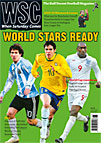 Berlin has just lost its only top-flight club, but reaction to Hertha's relegation has been fairly muted. Paul Joyce explains
Berlin has just lost its only top-flight club, but reaction to Hertha's relegation has been fairly muted. Paul Joyce explains
In March 2009, Hertha BSC were top of the Bundesliga and went on to finish fourth. The Berlin club were relegated a year later, however, having been bottom of the table since September. For the first time since 1997, Germany’s capital will be without top-flight football next season.
It might seem tempting to ascribe Hertha’s demise to Berlin’s financial meltdown. The capital has accumulated more debts – €66.2 billion (£56.4bn) –than any other German city. Yet Hertha’s problems have been largely self-inflicted. With the club €33m in debt, forwards Marko Pantelic and Andriy Voronin, key to coach Lucien Favre’s counter-attacking style, were allowed to depart in the summer of 2009. They were replaced by Artur Wichniarek, a striker who scored four goals in 44 games in his first spell at the club. The Pole failed to score at all this season.
Having won their first home match against Hannover 96 in August, Hertha gained only three more points in the first half of the campaign. It would take a heart of stone not to laugh at the manner of some of their defeats. In the 3-1 loss to Hamburger SV, goalkeeper Sascha Burchert came out of his area twice in two minutes to head clear – only for a HSV player to lob the ball into the net each time from the halfway line. And the third goal was an own-goal.
Favre was replaced as trainer by the dour Friedhelm Funkel in October, but couldn’t prevent the Alte Dame setting a Bundesliga record of 16 home matches without a win. After a home defeat against 1.FC Nuremberg in March, 150 fans stormed the pitch in the Olympiastadion and smashed up the dugouts. Less inhibited away from home, Hertha hammered reigning champions VfL Wolfsburg 5-1 in March but then missed countless chances to avoid the drop. Bayer Leverkusen’s coach Jupp Heynckes said that he had never seen a relegated team play such good football.
“If Hertha go down, then the whole of Berlin will feel second-class, even more unfinished, dirtier, poorer,” said the Berlin newspaper Der Tagesspiegel. Yet its readers disagreed almost unanimously. “Hertha BSC is not Berlin and Berlin is much more than just Hertha,” remarked one online guest. In a city where there are 83 top-flight clubs in sports such as basketball, handball and ice hockey, there is always another team to support. “Berlin has never been a football stronghold, unlike the Ruhrgebiet,” said Bernd Schiphorst, chairman of Hertha’s advisory board.
The division of the city from 1949 to 1989 has also prevented Berliners uniting behind Hertha. Despite the recent decline of Stasi club BFC Dynamo, East Berlin supporters have their own set of club allegiances. Only 16 per cent of Hertha’s members come from the East. “We can get young people from the former East interested in the club, but not the older generation,” Schiphorst believes. Hertha’s opponents next season will include Union Berlin, from the eastern district of Köpenick, whose fans contributed 140,000 hours in 2008-09 to rebuild their stadium. Competition will also come from SV Babelsberg 03, on the outskirts of the city, who have just been promoted to the third division.
Reunification has brought its own problems. After Berlin reverted to being the German capital, an estimated 1.9 million people moved to the city, bringing with them existing club allegiances. They visit the Olympiastadion at most once a year – as away supporters. “Berlin is a city of migrants, virtually every German team has its own fan club here,” said Manfred Sangel of the radio station Hertha-Echo.
Many West Berliners also have little time for Hertha due to their role in the match-fixing scandal of 1971 and the right-wing hooligan element among their fanbase. West Berlin teams such as Tasmania, who achieved the lowest number of points in Bundesliga history in 1965-66, Tennis Borussia and Blau-Weiss 90 have all briefly flourished as more palatable alternatives before sliding back into non-League anonymity. Even though they are fighting against impending administration and relegation from the fourth tier, Tennis Borussia still have a strong following among left-leaning supporters, as do Türkiyemspor, the multicultural club from Kreuzberg. Yet even the migrant fanbase is fragmented, with over 20 Turkish, Arabic, Jewish and Croatian clubs in the Berlin league pyramid.
It is the very absence of a consensus club in Berlin that makes watching football in the capital so satisfyingly diverse. Just don’t expect to see Bayern Munich if you come to visit next season.
From WSC 280 June 2010